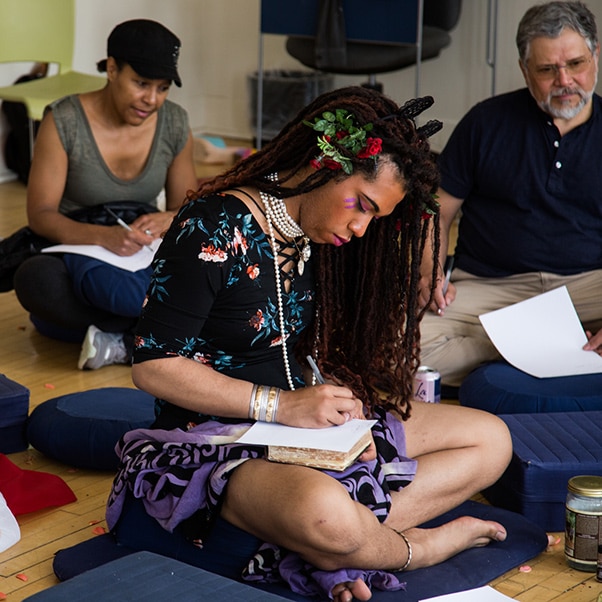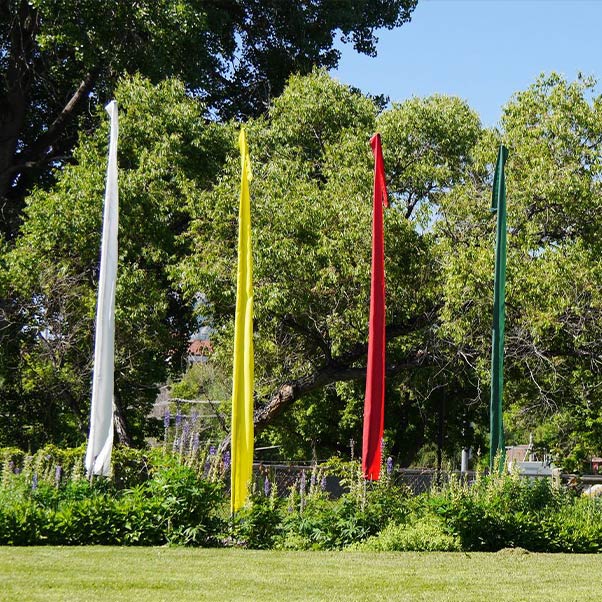Naropa University’s BA Psychedelic Studies Minor equips students with the knowledge and skills necessary to navigate the emerging field of psychedelic studies, while fostering critical thinking and ethical awareness.
At the heart of our curriculum is a humanities-focused approach, offering a comprehensive introduction to psychedelic practices. We delve into the rich tapestry of history, examining the development and cultural appropriation of psychedelic traditions. Through rigorous coursework, students develop the analytical tools needed to tackle the complex challenges inherent in this evolving industry.
While our program does not aim to train students to conduct psychedelic-assisted therapy, it serves as a springboard for thoughtful exploration of key issues in the field. Similar to pre-law or pre-med concentrations, our minor provides a solid foundation for engaging in meaningful dialogues surrounding the therapeutic, spiritual, and communal dimensions of psychedelics.
Psychedelic Studies Minor Requirements
Required Course
INTD 220/220e Introduction to Psychedelic Studies (3)
Choose 9 Credits from the Following Courses:
- PSYB 354/354e Transpersonal Psychology (3)
- PSYB 415/415e Maitri: Working With Emotions (3)
- PSYB 471/471e Theories of Psychedelic Assisted Therapies
- PSYB 495e Special Topics Advanced Research: Decolonial Psychology (3)
- PSYB 209 Herbal Medicine (3)
- WRI 490 Special Topics: White Rabbit: The Poetry of Psychedelics
Planned Courses
- Ecopsychedelics (3)
- Exploring Psychedelic Science (3)
- Religion and Psychedelics (3)
- Skillful Methods in Psychedelic Care (3)
Total Credits 12
- Academic Calendar
- Course Catalog
- Undergraduate Academics
- Core Curriculum
- Online Bachelor’s Degrees
- BA Art Therapy
- BA Art Therapy Online
- BA Creative Writing & Literature
- Elementary Education
- BA Environmental Studies
- Environmental Studies Online
- BA Interdisciplinary Studies
- Interdisciplinary Studies Online
- BA Psychology
- BA Psychology Online
- BA Religious Studies
- BA Visual Arts
- BA Yoga Studies
- BA Capstone Projects
- Graduate Academics
- Clinical Mental Health Counseling
- Buddhism-Informed Contemplative Counseling
- Mindfulness-Based Transpersonal Counseling
- Transpersonal Creative Art–Based Counseling
- Nature-Based Transpersonal Counseling
- Somatic Counseling
- Somatic Counseling: Dance/Movement Theories & Practice
- MFA Creative Writing and Poetics
- MFA Creative Writing (Low-Residency)
- Master of Divinity
- MA in Ecopsychology
- MA in Yoga Studies
- Academic Support
- Extended Campus
- Schools & Centers
- Courses Open to the Public
- Summer Writing Program
- Library
- Academic Affairs
What You'll Learn
Psychology & Neuroscience
Applying knowledge from peer-reviewed research to understand the psychological and neurological aspects of psychedelics.
History & Healing
Articulating an understanding of the historical and therapeutic uses of psychedelic medicines.
Contemplative Inquiry
Exploring the impact of psychedelics on individual and collective consciousness.
Literature & Art
Evaluating the interplay between psychedelics, creativity, and artistic expression.
Entrepre-neurial Thinking
Designing innovative projects to address challenges within the emerging field of psychedelic studies.
Justice, Equity, Diversity & Inclusion
Understanding and addressing issues of social justice and cultural appropriation within psychedelic practices.
Course Listings

INTD 220/220e—Introduction to Psychedelic Studies (3)
Concerns about the rising rates of overdose, suicide, and the prevalence of psychological disorders lacking in innovative treatments and sociopolitical reforms have enabled a renewed interest in the exploration of psychedelics as tools for healing and personal growth. Indeed, in recent years psychedelics have shown tremendous potential as medicines; however, evidence of their use among humans throughout ancient and contemporary history reveal a much more complicated anthropological, social, and political context to explore. This course offers a comprehensive introduction to the world of psychedelics substances from an interdisciplinary perspective. We will investigate four contexts in particular: indigenous traditions and spirituality, social justice, western medicine, and capitalism, and also consider how these contexts involving psychedelics have interacted with broader political, economic, and social issues throughout history. This course will incorporate contemplative engagement beyond the didactic lectures and exercises to direct a personal experiential opportunity for students to use to explore their own relationship with non-ordinary states of consciousness.

PSYB 209/209e—Herbal Medicine (3)
This course offers an introduction to the use of food, herbs, and other natural remedies to experience vital health. Students learn to make a few simple herbal preparations, and discuss herb safety and proper dosages. Topics include herbal history, food as medicine, reproductive health, emotional health, children’s health, addictions, psychoactive plants, aromatherapy, color therapy, feng shui, and careers in natural medicine. The class has an East-West approach and enables students to use plants and other natural therapies for their own health as well as for helping others.

PSYB 354/354e—Transpersonal Psychology (3)
An exploration of the basic principles of transpersonal psychology and psychotherapy. This is the so-called fourth force in the modern Western tradition of psychology, which emerged in the 1960s as an expansion and alternative to the psychoanalytic, behavioral, and humanistic schools that preceded it. Transpersonal, meaning beyond the persona or mask, studies human transcendence, wholeness, and transformation. Focus is on the work of Jung, Assagioli, Grof, Wilber, Walsh, Vaughan, and others to introduce students to transpersonal theory and practice. Students also explore their personal journey through a transpersonal lens

PSYB 415/415e—Maitri: Working With Emotions (3)
This course introduces the Vajrayana approach to the Five Buddha Family principles through Maitri Space Awareness practice and study. Students practice particular postures in specially designed rooms, inviting a personal exploration of psychological states of mind and emotions such as pride, passion, paranoia, ignorance, and aggressions. Approaching these emotions with curiosity and openness, there is the possibility of discovering one’s inherent wisdom, compassion, and insight. The course includes weekly lectures, practice in the maitri rooms, and participation in a smaller group to process material more personally. Prerequisite: PSYB325.
This online course introduces the Vajrayana approach to working with emotions through contemplative practice and study of the Five Buddha Family principles. Students examine attributes of the five wisdom energies, inviting a personal exploration of psychological states of mind and emotions such as pride, passion, paranoia, ignorance, and aggression. Approaching these emotions with curiosity and openness, there is the possibility of discovering one’s inherent wisdom, compassion, and insight. Prerequisite: PSYB325e.

PSYB 471/471e—Theories of Psychedelic-Assisted Therapy
Theories of Psychedelic-Assisted Therapy provides beginning coursework in understanding the history and foundations of psychedelic medicines used as healing modalities. This course centers on a harm reduction approach, considering the risks, safety concerns, ethical implications, and potential benefits of psychedelic use in therapeutic contexts. The course situates itself in an explicit healing justice approach, with an in-depth exploration of right relationship with indigenous cultures and medicines. This course is open only to third or fourth year students who have taken INTD 222/222e Introduction to Psychedelic Studies.

PSYB 495e—Special Topics Advanced Research: Decolonial Psychology (3)
This course studies and experientially participates in the decolonization of knowledge, the mind, and being within a variety of intersecting contexts: the psy disciplines (i.e., academic and clinical psychology, counseling, psychotherapy, psychiatry, psychedelic science, etc.); education, the university, academia; geopolitical space; and the individual psyche. Postcolonial and decolonial theories are used as primary lenses for understanding modernity/coloniality or the history of racism, sexism, classism, and other domination patterns perpetrated over the last 500 years. Study of indigenous, black, critical, liberation, and decolonial psychologies properly situates mainstream psychology as white, male, middle-class, Euro-American, English-speaking, heteronormative, cisgender, able-bodied, secular, and species-centered; reading and writing as epistemologically privileged yet potentially liberating cultural activities; and a transformed psychology as potential vehicle for individual, cultural, and ancestral healing. Students research their own ancestral psychologies–their people, familial roots, and cultural traditions–in the context of world history and renew ancestral ways of being, thinking, and knowledge/wisdom production.

WRI 490—Special Topics: White Rabbit: The Poetry of Psychedelics (3)
Interest in psychedelics has surged, waned, and resurfaced all through history. This course will read and listen to songs, poems, prayers, memoirs, and hybrid forms, inquiring what the entheogens have brought to innovations in language. Changes in how language gets used are changes in consciousness. Many contemplative states, practices to examine those states of mind, and records of such searches, lie within the written and recorded history of poetry. With an eye to discoveries made in prehistory and throughout history, we’ll read, and devise our own, writings that follow the White Rabbit of poetry. Vedic stotras to the Eleusinian mysteries, Romantic poets & opium to psychedelics ingested by Beat and Afro-Futurist writers, to music of Sun Ra and the Jefferson Airplane.
Note: the course does not advocate use of forbidden substances; it is an effort to understand how plant & chemical allies change the way people see and sing.

